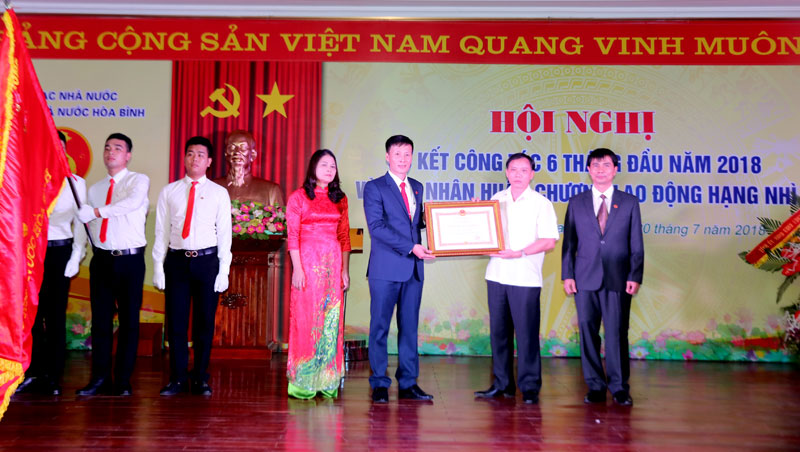
(HBO) – Hoa Binh’s State Treasury has received the second-class Order of Labour and reviewed its performance in the first half of 2018 in a recent event which was attended by Chairman of the provincial People’s Committee Bui Van Khanh.

Hoa
Binh’s State Treasury receives the Second-Class Order of Labour.
The provincial State Treasury was founded and officially started
operation on October 1, 1991. After 28 years of development, it now has seven
departments and 10 district branches with a total of 188 employees.
Over the years, it has exerted many efforts to fulfill its tasks
and cooperate with other governmental financial authorities to well perform its
State budget collection and expenditure functions.
From 2008 – 2017, the provincial State Treasury collected a total
of more than 72.5 trillion VND to the State budget revenue. In 2017, the
provincial State budget revenue exceeded 9.5 trillion VND, a 3.4-fold increase
from that of 2008.
During the period, it made a total payment of over 79.2 trillion
VND with last year’s spending estimated at more than 10.6 trillion VND, 2.7
times that of 2008.
The office’s units have identified over 2,800 payment inquiries
lacking of required documents and rejected to cover a combined payment of about
257 billion VND.
In the first six months of this year, it has reviewed payments
worth a total of more than 4 trillion VND, accounting for 52.8 percent of the
estimates set by the Government and 50.4 percent of those by the provincial
People’s Council. The figure included 3.4 trillion VND allocating for district
and commune budgets.
At the same time, it has worked hard to ensure safety and security
of the State’s budget and assets, accelerate public administrative reforms and
apply information technology in operation.
To recognize its achievements over many years, particularly from
2012 – 2016, President Tran Dai Quang has honoured the Hoa Binh State Treasury
with a second-class Order of Labour./.
The Standing Board of the Hoa Binh provincial Party Committee has agreed in principle on a proposal by the Standing Board of the Party Committee of Hoa Binh city to gather feedback on the city’s 1:2000 zoning plan, which forms part of its broader urban development strategy.
Hoa Binh province has made notable progress in public administration reform and digital government development, with the satisfaction index among citizens and businesses reaching over 84%, according to recent government evaluations.
Thanks to great efforts by local authorities in recent times, the governance and public administration performance of Mai Chau district has been significantly improved.
In the afternoon of June 6, the Party Committee, the People's Council, the People's Committee and the Fatherland Front of Lac Son district solemnly held a meeting to celebrate the 139th anniversary of the district's founding (1886–2025) and the 79th anniversary of the establishment of the district's Party Committee (1946–2025). There was the attendance of Mr. Bui Van Thang, the Vice Chairman of the Provincial People's Council; Mr. Quach Tat Liem, the Vice Chairman of the Provincial People's Committee; Ms. Dang Bich Ngoc, the Deputy Head of the National Assembly Delegation of the province; as well as the former leaders of the province and district through various periods, who are the natives of the district.
Implementing the Politburo’s Resolution No. 57-NQ/TW on breakthroughs in science – technology, innovation, and digital transformation is a golden opportunity for the northern mountainous province of Hoa Binh to renew growth model, improve competitive edge and shorten digital gap.
Resolution 57-NQ/TW, issued by the Politburo on December 22, 2024, identifies sci-tech, innovation, and digital transformation as strategic breakthroughs to build a developed and prosperous nation. In Hoa Binh province, this spirit is not just a slogan, it’s being put into action through concrete initiatives that form a "new development triangle”: digital citizenship, digital economy, and digital administration.



